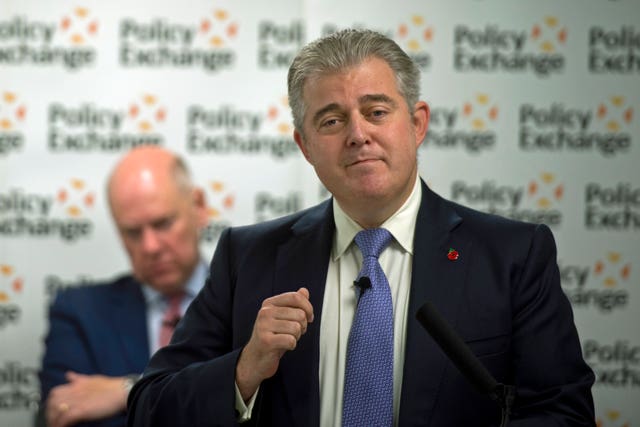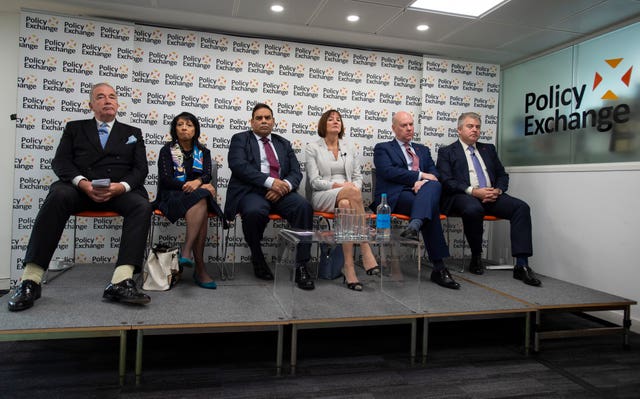Hard to see plus side for security after Brexit, says former MI5 boss
Ex-director general of the security service Lord Jonathan Evans made the comments at a talk on Wednesday.

A former MI5 boss has warned it is “very hard to see any security upside” to Brexit.
Speaking at an event in London on Wednesday, Lord Jonathan Evans – director-general of the security service from 2007 to 2013 – raised concerns about the UK’s access to intelligence held by Europol and other resources after leaving the European Union.
Appearing as part of a panel discussing how crime-fighting and security strategies could be affected after Brexit at the talk hosted by the Policy Exchange think tank, he said: “I have to say I find it very hard to see any security upside from Brexit.
“So it seems to me that our task is to minimise the downside.”
He suggested intelligence-sharing between the UK and Europe would not be “significantly hampered” but said: “The risk, in my view, with Brexit is that there will be differential impact on the one hand on the intelligence relationships, and on the other the law enforcement agencies.”
It is “absolutely vital” that close links with Europol remain, he said, adding: “It’s hard to imagine that we will be in quite such a good place after Brexit but we need to do our best to compensate for any deficit.”
It is key the UK maintains a link between the EU and the Five Eyes intelligence group, which also involves Australia, New Zealand, the US and Canada, he said.
The UK needs to “exert as much influence as we can over EU policy-making”, he added.

Security Minister Brandon Lewis insisted the Prime Minister’s deal means the Government has a “really ambitious programme to have a really strong relationship around security” with Europe after Brexit.
Alluding to the Conservative Party’s forthcoming election campaign, he said: “We are the only party absolutely focused and determined to crack down on crime.”
He said Boris Johnson’s Brexit deal offers an “opportunity for UK security”, giving scope to look beyond “traditional” crime-fighting measures.
He said he hoped that, as well as maintaining close links with law enforcement bodies in the EU, and through the Five Eyes network, the UK could also work more with Egypt, Pakistan, Tunisia and India.
Lord Alan West, head of the Royal Navy from 2002 to 2006 and security minister from 2007 to 2010, said: “If we stay in or come out, it’s not going to make that much difference to our security.”
He felt defence could benefit from leaving the EU but there could be a “slight downside” in the UK’s work to catch criminals, saying: “Let’s not kid ourselves, the EU wasn’t good at this.
“They were a shambles, to be quite honest.
“It’s sad, in a way, that we are not going to be so closely linked and we have got to stay closely linked.”

But he said maintaining the “special relationship” with the US is more important for sharing intelligence, adding that the UK “ignores that at its peril”.
He said “the risk of state-on-state war is greater now than it has ever been since the end of the Cold War”, as well as the risk of the use of nuclear weapons.
He also branded maritime border security a “national disgrace”.
Baroness Kishwer Falkner, member of the Lords and Commons national security strategy committee from 2015 to 2017, said she saw “fewer obstacles” in keeping a “strategic relationship” with the EU after Brexit.
But she said Germany particularly has concerns about the UK’s commitments to Nato after Brexit.
Khalid Mahmood, shadow minister for Europe in the Labour foreign and commonwealth affairs team, said there needs to be more “protection” at the UK’s borders and a review of the resources being made available, adding: “The election is here and we are all making promises.”
Panel members were also asked about their position on Huawei using the UK’s 5G network.
Lord West said: “I don’t trust the Chinese at all. I don’t trust where they are going but I don’t think it means we can’t use Huawei.”
Mr Lewis, who sits on the National Security Council, said the Government has not made a decision.
He would not comment further on the matter when asked if the decision would be made before the election.





